日入一词_143:share (verb)
Posted
tags:
篇首语:本文由小常识网(cha138.com)小编为大家整理,主要介绍了日入一词_143:share (verb)相关的知识,希望对你有一定的参考价值。
参考技术A It shareswith OOP the aim of making it simpler to reuse code and the technique of abstracting general concepts.verb /ʃɛr/
1
We don’t have enough books, so you’ll have to share.
The three of us shared a taxi.
share something with somebody
I have an office that I share with some other teachers.
We share a house/car (together).
I share an office with two other people.
Sue shares a house with three other students.
There isn't an empty table. Would you mind sharing?
She's very possessive about her toys and finds it hard to share. [possessive = adjective, /pə'zɛsɪv/, 1). wanting someone to have feelings of love or friendship for you and no one else. 2). unwilling to let other people use something you own]
Bill and I shared an office for years.
I share a house with four other people.
Do you mind sharing a table?
There’s only one copy left, so we’ll have to share.
I share this flat with five other people.
the small income he had shared with his brother from his father's estate. [estate = noun, /ɪ'stet/, all of someone’s property and money, especially everything that is left after they die]
Two Americans will share this year's Nobel Prize for Medicine.
Scarce water resources are shared between states who cannot trust each other. [scarce = adjective, /skɛrs/, if something is scarce, there is not very much of it available]
Most hostel tenants would prefer single to shared rooms. [tenant = noun, /'tɛnənt/, someone who lives in a house, room etc and pays rent to the person who owns it → landlord /'lændlɔrd/, landlady /'lændledi/]
2
As a kid, he’d never share his toys.
share something with somebody
Will you share your fries with me?
The children need to learn to share their toys.
He doesn't share his toys with other kids.
Share the cookies with your sister.
The children need to learn to share (with each other).
Eli shared his chocolate with the other kids.
The conference is a good place to share information and exchange ideas.
Bob told Jess he wanted to share his life with her.
John had no brothers or sisters and wasn't used to sharing.
He would never share his toys with me.
The village tribe is friendly and they share their water supply with you.
Scientists now have to compete for funding, and do not share information among themselves.
Toddlers are notoriously antisocial when it comes to sharing toys. [toddler = noun, /ˈtɑdlɚ/, a very young child who is just learning to walk] [notorious = adjective, /no'tɔrɪəs/, famous or well known for something bad SYN infamous]
3
share something between/among somebody
They shared the cake between them.
On his death, his property was shared out between his children.
They shared the last cookie.
We shared the money equally.
share out (phrasal verb)
share out (something) or share (something) out (CHIEFLY BRIT)
In her will, she shared out her property to her nephews and nieces.
We shared the pizza between the four of us.
Rita shared her money out among her six grandchildren.
Profits are shared out yearly.
Will you share your sandwich with me?
Let's share the sweets (out) among/between everyone.
We should share (in) the reward.
I’m going to share this 5 ways, okay?
share something between/among someone
The money will be shared between 30 different environmental organizations.
We had one pizza shared out between us.
If you start taking the prize money off the people from the top then you could share it out a bit more equally.
Warsaw Pact members have failed to agree on how to share out proposed cuts in tank numbers.
a formula for sharing out power among the various clans. [clan = noun, /klæn/, 1). a large group of families who often share the same name. 2). a very large family]
4
We share the responsibility for the children.
I own the house, but we share the bills.
We all share some of the blame for the accident. [blame = verb, /blem/, 1). to say or think that someone or something is responsible for something bad. noun, /blem/, responsibility for a mistake or for something bad. blame for ]
I share the blame for what happened.
We all share in the responsibility for this tragedy.
The whole family shares in the household chores.
I try to get the kids to share in the housework.
Both drivers shared the blame for the accident.
Shall we share the driving?
We shared the preparation for the party between us, so it wasn't too much work.
We share responsibility for meeting the targets. [meet = verb, /mit/, 11). meet a deadline to finish something at the time it is meant to be finished.We are still hoping to meet the November deadline. 12). meet a goal/target etc to achieve something that you are trying to achieve. It’s impossible to meet the sales targets. The scheme does not meet its objectives.]
You can find out whether they are prepared to share the cost of the flowers with you.
The republics have worked out a plan for sharing control of nuclear weapons.
5
share somebody’s view/concern/belief etc
Other parents share her belief in the importance of reading.
I believe my view is widely shared .
share something with somebody
stubbornness was a characteristic he shared with his mother. [stubborn = adjective, /'stʌbɚn/, 1). determined not to change your mind, even when people think you are being unreasonable. 3). difficult to remove, deal with, or use SYN tough]
We share an interest in baseball. [=we are both interested in baseball].
The two countries share a border.
I know you're worried about the schedule, but I don't share your concerns. [=I don't have the same concerns that you have; I am not worried about the schedule]
I share these concerns with others in the group.
I don't share in your concerns about the schedule.
They shared a common interest in botany. [botany = noun, /'bɑtəni/, the scientific study of plants]
a view that is widely shared.
shared values.
People often share their political views with their parents.
I didn't really share in her love of animals.
We share an interest in sailing.
All hospitals share some common characteristics.
I don't share your views/beliefs.
Management and the union both share in the responsibility for the crisis.
She knew that he was the person she wanted to share her life with.
I share the views expressed by my colleague.
Not everyone will share your enthusiasm for this scheme.
Yes, I want to share my life with you.
I felt we both shared the same sense of loss, felt the same pain.
The forum's members share his view that business can be a positive force for change in developing countries.
Prosperity and economic success remain popular and broadly shared goals. [prosperity = noun, /prɑ'spɛrəti/, when people have money and everything that is needed for a good life. the state of being successful usually by making a lot of money]
La Repubblica and El Pais are politically independent newspapers which share similar characteristics with certain British newspapers.
two groups who share a common language.
6
Students were able to share their experiences.
share something with somebody
Would you like to share your feelings with the group?
Please share any ideas that you may have.
Would you like to share your feelings with the group?
Thanks for sharing that (with me).
Thanks for sharing.
Men often don't like to share their problems.
The two friends shared everything—they had no secrets.
Would you like to share your experience with the rest of the group?
The group listens while one person shares (= tells other people about their experiences, feelings, etc.).
problem shared is a problem halved
He's not very good at sharing his worries.
It's nice to have someone you can share your problems with.
Come on, Bob, share the joke (with us).
Thanks for sharing.
They meet to share secrets and relive old memories. [relive = verb, /ˌri'lɪv/, to remember or imagine something that happened in the past so clearly that you experience the same emotions again. The girls watch the tape, eager to relive their victory against UCLA.]
Newsgroups enable patients to share information.
It can be beneficial to share your feelings with someone you trust.
Film critic Bob Mondello shares his thoughts on the movie `City of Hope'.
7
share your life with somebody
I’m not ready to share my life with anyone.
8
share and share alike
Don't keep all those chocolates to yourself - share and share alike.
9
share in something (phrasal verb)
His daughters did not share in his happiness.
The company is offering you the chance to share in its success.
Everybody shares in the cooking chores.
sharer noun, /'ʃεərə/
日入上万,Jack 年入百万?
老读者应该知道,我炒股两年多了。
从最开始的基金,到后来的股票,金额一直不大,最多就加到30万。
涨势最好的时候,差不多每天能有个近万的浮盈,偶尔还有过浮盈近两万的时候。
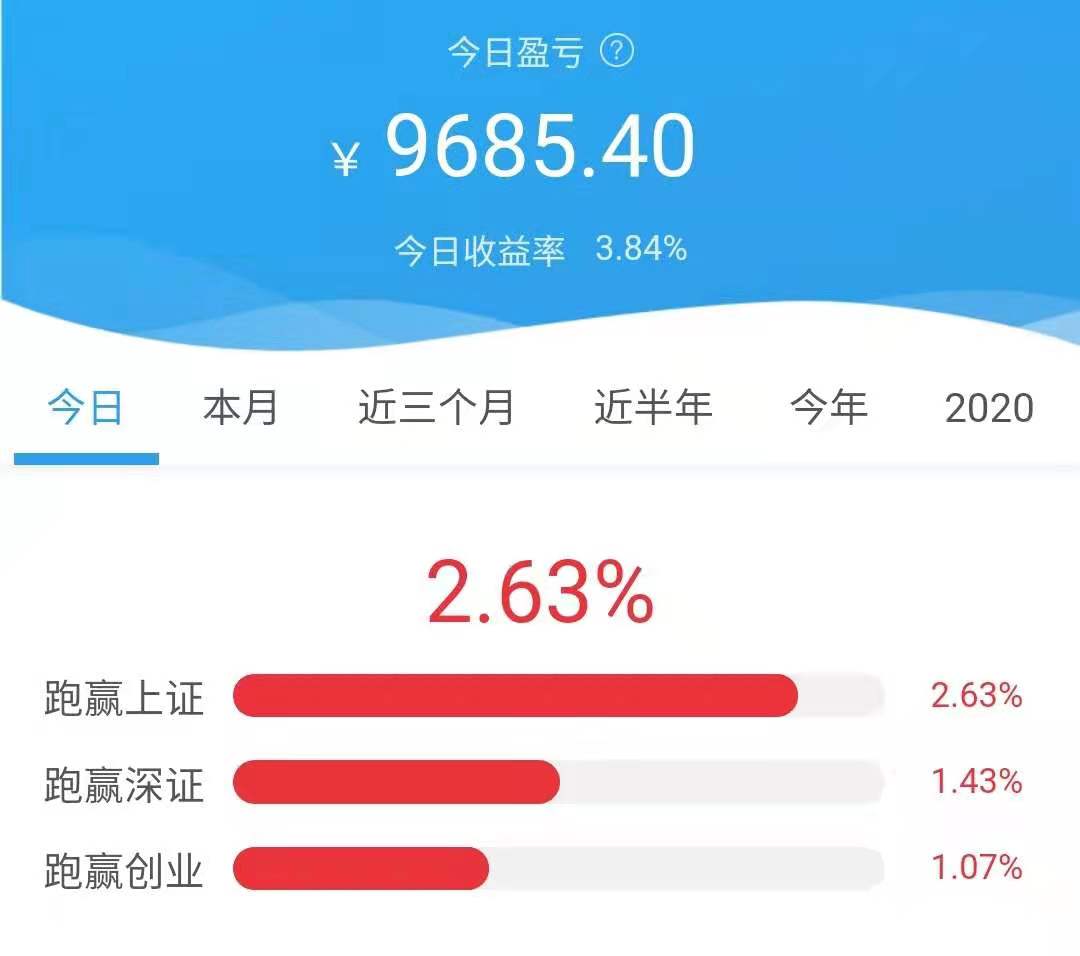
自从今年2月份,股市开启困难模式后,这样的好日子就到头了。
年初,大几万的浮盈,也折损了大半,再加上今年计划要用到大钱,身体被掏空的那种。

股市投资这块就保守了很多,基本固定在10万左右的低仓位,重在参与了。
一直有读者想看我理财类的文章,最开始应允下来,后来仔细想了想。
你说,我一个技术类博主,写理财,那不是不务正业吗?
况且,我也不是学金融出身的,虽然凭运气在股市赚过一些小钱,但毕竟咱不是专业的,不敢乱指挥。
最近突然转念一想,理财+技术,这个我可以啊~
我很喜欢学新知识,不仅仅局限于计算机技术,时刻保持一颗好奇心,什么都想学点。
正好,近期打算出一篇量化交易的视频,探讨探讨人工智能技术,在投资股市这件事上的应用。
学着学着,我发现,这里面的水挺深,“我把握不住”。
量化交易,并没有我想像的那么好做,要学的知识有点多。
一个周末的时间,也就入了个门。
今天,先整理分享下,量化交易的基础知识,为视频做个热身。
量化交易
量化交易就是,借助现代统计学和数学的方法,利用计算机技术来进行交易的证券投资方式。
主要涵盖的知识点如下:
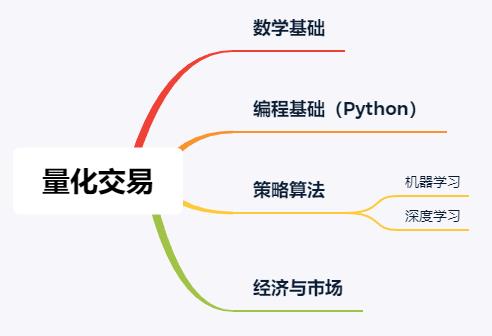
数学、编程、金融、算法都得懂,哪里不会补哪里就行。
量化平台
抓数据,写策略,在线交易,如果自己一个人来做,成本太高,不利于初期的学习。
我调研了一些量化分析平台,可以帮助我们聚焦到学习量化交易的策略学习上。
我觉得可以用来入门的平台有:
-
聚宽
-
vnpy
量化交易的平台有很多,比如掘金、米筐、优矿等。
但适合入门的,可以直接看这聚宽和vnpy。
聚宽的社区比较活跃,有不少技术教程,适合新手入门。
https://www.joinquant.com/study
这里的知识点,就有不少可以学习,同时还有很多大佬分享自己的策略。
vnpy推荐的原因在于它是开源的,可以系统学习如何构建一个量化交易系统。
https://github.com/vnpy/vnpy
如果想自己实现一个量化交易的框架,可以从这里参考很多代码。
小试牛刀
聚宽量化交易平台的使用,比较简单。
我们以这个平台为例,讲解一个简单的量化策略。
我们回归问题的本质,买股票无非两点:
-
买哪支股票
-
何时买,何时卖
1、买哪支股票
投资者,选股票,最直接的就是看财务报表。
至少是包括资产负债表、损益表、现金流量表,这三表。
这里的数据就太多了,每个表都有各种各样的指标。
这些指标数据,在量化交易里,叫因子。
我理解,就是我们机器学习中,常说的特征,每一个因子都可以算作一个维度的特征。
我们可以,利用这些已知的数据,构建多维的特征数据,然后将它交给机器学习算法,让算法判断这只股票,值不值得购买。
这又回到了,做算法的老生常谈的问题,选择哪些特征,去拟合数据。
妥了,特征工程走起。
这些最底层的特征,属于一种基础的因子。
在量化交易中,还可以根据这些数据,计算出更“高维”的因子,即特征。
比如净资产收益率,英文缩写叫ROE。
净资产收益率就是公司税后利润除以净资产得到的百分比率。
即,净资产收益率=净利润/净资产
净利润,在利润表里,净资产,在资产负债表。
净资产收益率反映股东权益的收益水平,用以衡量公司运用自有资本的效率。
指标值越高,说明投资带来的收益越高。该指标体现了自有资本获得净收益的能力。
净资产收益率,就是通过一些“低维”的特征,计算出的“高维”的特征。
选股票,其实就是根据这些指标,选择出,你认为值得投资的股票。
为了简化策略,这里就简单的,单一的,利用这个净资产收益率ROE,作为我们的价值选股思想的指标。
简单暴力一点,计算当前所有股票的ROE,由大到小排序,选择top10,作为我们的股票持仓。
2、何时买,何时卖
投资者,都想买在低点,卖在高点。
10块钱买,100块卖,赚个差价,赚了90。
这个问题的本质就是:低买高卖。
但现实往往是残酷的。

何时买,何时卖,在量化交易中,有个指标,阻力支撑相对强度,即RSRS。
了解,阻力支撑相对强度,首先要知道什么是阻力位和支撑位。
阻力位是指目标价格上涨时可能遇到的压力,即交易者认为卖方力量开始反超买方,从而价格难以继续上涨或从此回调下跌的价位;
支撑位则是交易者认为买方力量开始反超卖方,从而止跌或反弹上涨的价位。
阻力支撑相对强度是一种阻力位与支撑位的运用方式,它不再把阻力位与支撑位当做一个定值,而是看做一个变量,反应了交易者对目前市场状态顶底的一种预期判断。
我们按照不同市场状态分类来说明支撑阻力相对强度的应用逻辑:
市场在上涨牛市中:
-
如果支撑明显强于阻力,牛市持续,价格加速上涨
-
如果阻力明显强于支撑,牛市可能即将结束,价格见顶
市场在震荡中:
-
如果支撑明显强于阻力,牛市可能即将启动
-
如果阻力明显强于支撑,熊市可能即将启动
市场在下跌熊市中:
-
如果支撑明显强于阻力,熊市可能即将结束,价格见底
-
如果阻力明显强于支撑,熊市持续,价格加速下跌
每日最高价和最低价是一种阻力位与支撑位,它是当日全体市场参与者的交易行为所认可的阻力与支撑。一个很自然的想法是建立最高价和最低价的线性回归,并计算出斜率。即:

当斜率值很大时,支撑强度大于阻力强度。在牛市中阻力渐小,上方上涨空间大;在熊市中支撑渐强,下跌势头欲止。
当斜率值很小时,阻力强度大于支撑强度。在牛市中阻力渐强,上涨势头渐止;在熊市中支撑渐送,下方下跌空间渐大。
RSRS指标的计算,有两种方法,第一种方法是直接将斜率作为指标值,第二种方法是在斜率基础上进行标准化。
以第二种方法为例,RSRS斜率标准分指标择时策略如下:
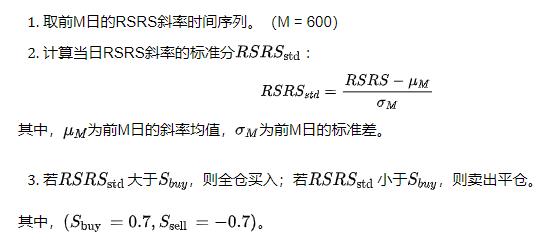
小试牛刀
OK,买哪支股票,以及何时买,何时卖,这两个问题解决了,我们就可以开始写代码了。
这里需要先掌握,聚宽的使用方法,以及一些api。
这部分比较简单,直接平台的官方手册就行。
编写如下代码:
'''
策略思路:
选股:财务指标选股
择时:RSRS择时
持仓:有开仓信号时持有10只股票,不满足时保持空仓
'''
# 导入函数库
import statsmodels.api as sm
from pandas.stats.api import ols
# 初始化函数,设定基准等等
def initialize(context):
# 开启动态复权模式(真实价格)
set_option('use_real_price', True)
# 过滤掉order系列API产生的比error级别低的log
# log.set_level('order', 'error')
set_parameter(context)
### 股票相关设定 ###
# 股票类每笔交易时的手续费是:买入时佣金万分之三,卖出时佣金万分之三加千分之一印花税, 每笔交易佣金最低扣5块钱
set_order_cost(OrderCost(close_tax=0.001, open_commission=0.0003, close_commission=0.0003, min_commission=5), type='stock')
## 运行函数(reference_security为运行时间的参考标的;传入的标的只做种类区分,因此传入'000300.XSHG'或'510300.XSHG'是一样的)
# 开盘前运行
run_daily(before_market_open, time='before_open', reference_security='000300.XSHG')
# 开盘时运行
run_daily(market_open, time='open', reference_security='000300.XSHG')
# 收盘后运行
#run_daily(after_market_close, time='after_close', reference_security='000300.XSHG')
'''
==============================参数设置部分================================
'''
def set_parameter(context):
# 设置RSRS指标中N, M的值
#统计周期
g.N = 18
#统计样本长度
g.M = 1100
#首次运行判断
g.init = True
#持仓股票数
g.stock_num = 10
#风险参考基准
g.security = '000300.XSHG'
# 设定策略运行基准
set_benchmark(g.security)
#记录策略运行天数
g.days = 0
#set_benchmark(g.stock)
# 买入阈值
g.buy = 0.7
g.sell = -0.7
#用于记录回归后的beta值,即斜率
g.ans = []
#用于计算被决定系数加权修正后的贝塔值
g.ans_rightdev= []
# 计算2005年1月5日至回测开始日期的RSRS斜率指标
prices = get_price(g.security, '2005-01-05', context.previous_date, '1d', ['high', 'low'])
highs = prices.high
lows = prices.low
g.ans = []
for i in range(len(highs))[g.N:]:
data_high = highs.iloc[i-g.N+1:i+1]
data_low = lows.iloc[i-g.N+1:i+1]
X = sm.add_constant(data_low)
model = sm.OLS(data_high,X)
results = model.fit()
g.ans.append(results.params[1])
#计算r2
g.ans_rightdev.append(results.rsquared)
## 开盘前运行函数
def before_market_open(context):
# 输出运行时间
#log.info('函数运行时间(before_market_open):'+str(context.current_dt.time()))
g.days += 1
# 给微信发送消息(添加模拟交易,并绑定微信生效)
send_message('策略正常,运行第%s天~'%g.days)
## 开盘时运行函数
def market_open(context):
security = g.security
# 填入各个日期的RSRS斜率值
beta=0
r2=0
if g.init:
g.init = False
else:
#RSRS斜率指标定义
prices = attribute_history(security, g.N, '1d', ['high', 'low'])
highs = prices.high
lows = prices.low
X = sm.add_constant(lows)
model = sm.OLS(highs, X)
beta = model.fit().params[1]
g.ans.append(beta)
#计算r2
r2=model.fit().rsquared
g.ans_rightdev.append(r2)
# 计算标准化的RSRS指标
# 计算均值序列
section = g.ans[-g.M:]
# 计算均值序列
mu = np.mean(section)
# 计算标准化RSRS指标序列
sigma = np.std(section)
zscore = (section[-1]-mu)/sigma
#计算右偏RSRS标准分
zscore_rightdev= zscore*beta*r2
# 如果上一时间点的RSRS斜率大于买入阈值, 则全仓买入
if zscore_rightdev > g.buy:
# 记录这次买入
log.info("市场风险在合理范围")
#满足条件运行交易
trade_func(context)
# 如果上一时间点的RSRS斜率小于卖出阈值, 则空仓卖出
elif (zscore_rightdev < g.sell) and (len(context.portfolio.positions.keys()) > 0):
# 记录这次卖出
log.info("市场风险过大,保持空仓状态")
# 卖出所有股票,使这只股票的最终持有量为0
for s in context.portfolio.positions.keys():
order_target(s, 0)
#策略选股买卖部分
def trade_func(context):
#获取股票池
df = get_fundamentals(query(valuation.code,valuation.pb_ratio,indicator.roe))
#进行pb,roe大于0筛选
df = df[(df['roe']>0) & (df['pb_ratio']>0)].sort('pb_ratio')
#以股票名词作为index
df.index = df['code'].values
#取roe倒数
df['1/roe'] = 1/df['roe']
#获取综合得分
df['point'] = df[['pb_ratio','1/roe']].rank().T.apply(f_sum)
#按得分进行排序,取指定数量的股票
df = df.sort('point')[:g.stock_num]
pool = df.index
log.info('总共选出%s只股票'%len(pool))
#得到每只股票应该分配的资金
cash = context.portfolio.total_value/len(pool)
#获取已经持仓列表
hold_stock = context.portfolio.positions.keys()
#卖出不在持仓中的股票
for s in hold_stock:
if s not in pool:
order_target(s,0)
#买入股票
for s in pool:
order_target_value(s,cash)
#打分工具
def f_sum(x):
return sum(x)
## 收盘后运行函数
def after_market_close(context):
#得到当天所有成交记录
trades = get_trades()
for _trade in trades.values():
log.info('成交记录:'+str(_trade))
#打印账户总资产
log.info('今日账户总资产:%s'%round(context.portfolio.total_value,2))
#log.info('##############################################################')
左边写好代码,输入回测时间和金额就可以运行了。
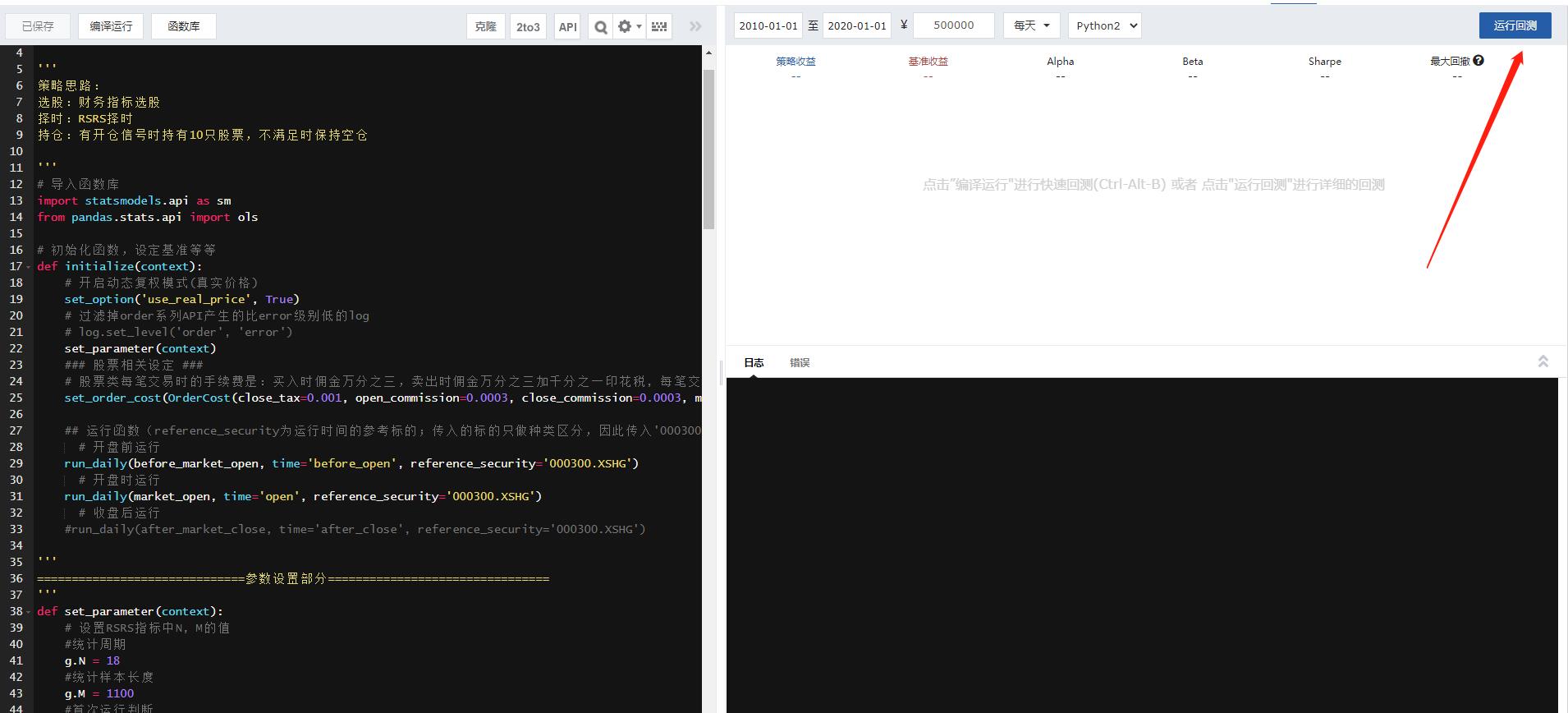
我直接回测了2010年1月到2020年1月效果,投资十年的收益:

直接起飞,初始资金50万,赚了几百万,很稳!
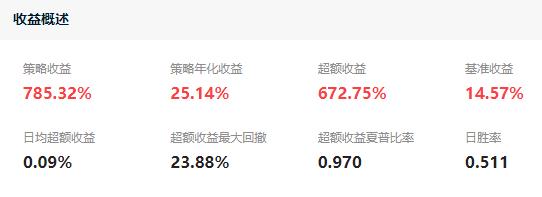
我又回测了2020年1月到2021年6月,一年半的收益:

跑输大盘8.35%,不过也没亏,年化率也能有个11.40%,还可以吧。
总结
这个策略,没有用到历史数据,是根据当前的一些指标进行决策的。
投资理财,这方面的知识,还是要学习的,不投资股市,买个银行定期这些也挺好。
我们寒窗苦读,一方面就是想学有所成,赚钱,过个舒服的生活。
学校教我们各种基础知识,唯独很少直接地教我们,如何去赚钱,去理财,管理自己的财富。
所以,自学吧。人生在于折腾,各种知识都学学,挺好,挺有意思。
现在,虽然股市是困难模式,但是仍然有很多机会,我们也可以利用这个时间,补充自己的知识。
本期硬核,喜欢的朋友,转发,点赞走一波,让我瞧瞧。
感兴趣,后面继续出。
最后再送大家一本,帮助我拿到 BAT 等一线大厂 offer 的数据结构刷题笔记,是一位 Google 大神写的,对于算法薄弱或者需要提高的同学都十分受用:
以及我整理的 BAT 算法工程师学习路线,书籍+视频,完整的学习路线和说明,对于想成为算法工程师的,绝对能有所帮助:
我是 Jack,我们下期见!
以上是关于日入一词_143:share (verb)的主要内容,如果未能解决你的问题,请参考以下文章
请问用触发器:在负责人中加入一条记录,对应的部门ID里的成员数量加一
OperationalError: (2019, ""Can't initialize character set utf8mb4 (path: C:\\mysql\\\\shar